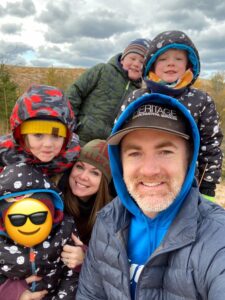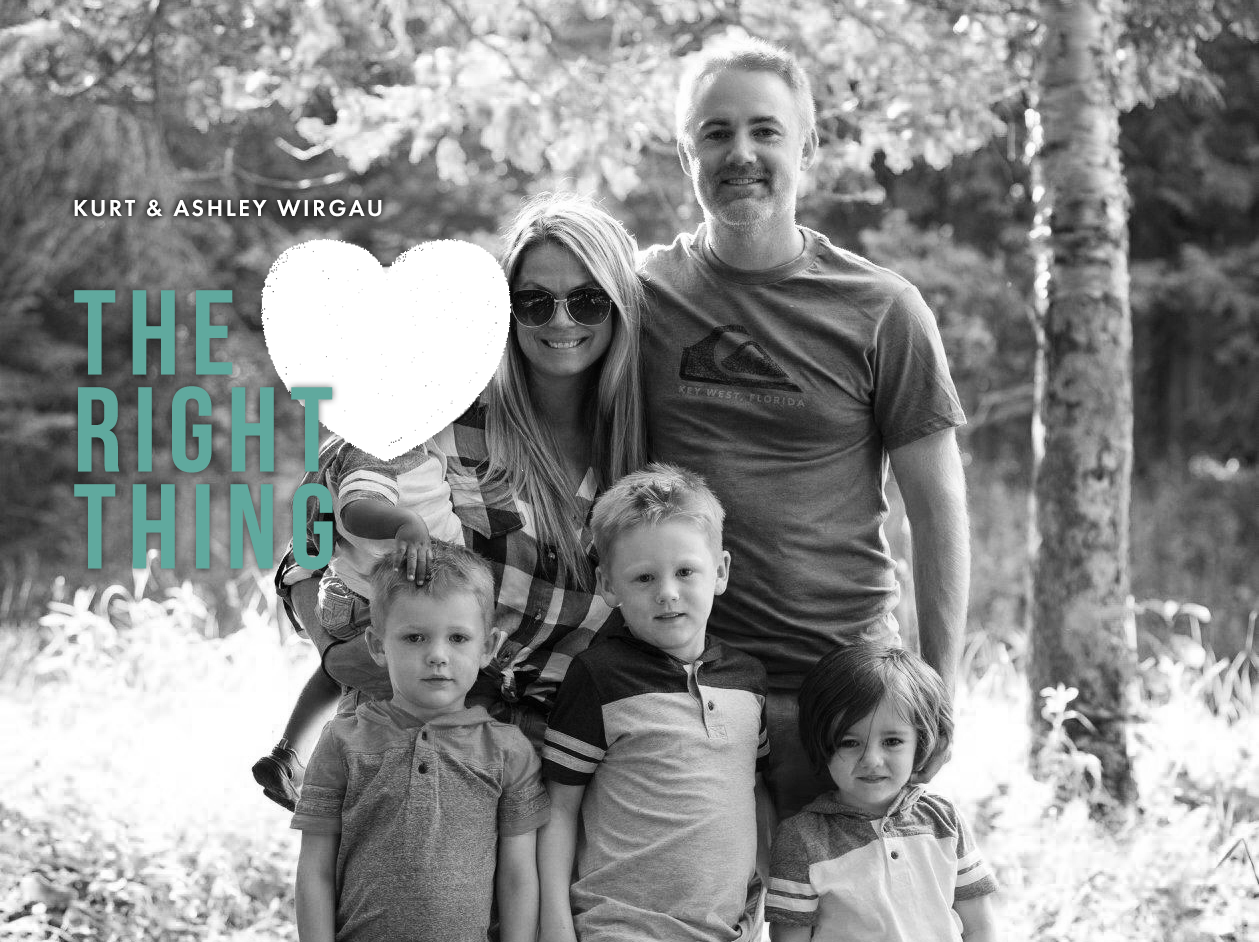Featured in our June edition of The Ottawa Advocate
THE RIGHT THING.
“Please, Mom. Please! Don’t do the right thing.”
My son is nearly hysterical.
“Just this time. Don’t do the right thing! You don’t always have to do the good thing every time!”
He coughs out these words between red-faced cries. T-shirt wet with tears, he begs, hoping if he screams loud enough, long enough, I might send our newest house guests packing. This child whom I have loved longer than any other is asking that, this time, I pick the wrong path. Wiping the wet from his cheeks, I wish that I could.
“Baby, hey. Calm down. Take a breath.” He can’t. I’ve lost him. He has committed to the emotional avalanche that’s been building for the past few weeks.
“I know this is hard. This is so hard for all of us, baby. Mama sees how much you are struggling, and I know you want them to go.”

And we have to do the right thing. Even when it’s so hard. – Ashley Wirgau
How naïve. How short-sighted of us to assume that only certain children of certain ages of certain behaviors or medical conditions (a.k.a. no behaviors and no medical conditions) were deserving of our time. Who exactly did we think we were going to help? A wholly nurtured baby, orphaned in the woods, whose entire family had tragically died on some picnic-gone-wrong? What kind of Disney nonsense did we imagine foster care to be?
Then our first placement arrived, and while his story was far from an animated happily ever after, it was relatively “easy.” He was instantly loved and welcomed. Our children never came to us in tears, upset over the space this child occupied. No one laid screaming in their beds, demanding we shove him out the door. We didn’t have to try to accept his presence in our lives; it was automatic.
But now, here we sit, on our son’s bottom bunk, in the wake of all our broken promises. We have taken on a placement riddled with “we’ll nevers” and our biological children are loudly sounding the alarm.
“But you have to consider the effects on your own children,” people say. Believe me when I tell you that I am. Every day, my husband and I weigh the risk versus reward, contemplating which choices best serve not only our family but the world that exists outside of us. Then, we make these giant decisions for our children (yes, occasionally without their consent) because they do not fully understand what it means for another child to live without the support and safety they have always known.
But we can teach them. We can show them firsthand that their reality is not the only reality, and sometimes this means breaking the promises we made when we didn’t know any better.
But we can teach them. We can show them firsthand that their reality is not the only reality, and sometimes this means breaking the promises we made when we didn’t know any better.
This time, it seems we have broken nearly every promise in order to keep the one most essential – to do the right thing, to choose love above all else, even when it’s so very hard. I write this from a hospital room beside a child who is not my own while my husband drives the other five north for a holiday weekend. Doing the right thing doesn’t always feel good. Sometimes it tastes like loneliness, flat Pepsi and hand sanitizer. But that doesn’t make it any less necessary.
Tonight, I sit at my foster son’s bedside, a child we chose to welcome even though we didn’t really want to, knowing his presence would make all of our lives harder for a time. This child we have known for little more than a month is a lot to handle and can be difficult to love. He does not know our ways or our hearts, nor we his – not yet.
But slowly, hour by hour, I will stand by this choice. I will watch him sleep as the IV drips and nurses tap keyboards behind a rainbow-colored curtain. Together, we will gaze out the wall of windows, waiting for a helicopter to land on the roof across the street. We will make Play-doh pizzas and nibble cold French fries drowning in ketchup. Curled up on a too-stiff armchair, we will watch movies that paint orphans as cherubs who forget dead parents to fall in love with new families. No trauma histories or hospital beds. No screams in the night for Mommies and Daddies out of reach.
This is no fairy tale.
“I know you want them to go. I know you want that more than anything else right now, baby boy, but you are right. That is not the right choice. And we have to do the right thing. Even when it’s so hard.”
Hearing this final verdict, the hope still lingering inside my firstborn child evaporates. He closes his eyes and dives headfirst into cold wet anger, knowing this would be my answer. As he begged me to send away a child who a month ago was nothing more than a name, I calmly, quietly, whispered a call to love.
But my goal is to raise children who are resolute in their ability to choose what is right, even when they don’t really want to.
Behind each name is a wanting child. And to pretend that a child with a history that is inflicted upon them is worth less than the one crying in my arms makes no sense to me anymore. They are all worthy. Yes, it will be hard. It already is. But my goal is to raise children who are resolute in their ability to choose what is right, even when they don’t really want to.
When we started down this road, we took all the safety precautions, setting up guard rails and bright orange cones to keep our family protected. We wanted to do the right thing as long as our path stayed smooth and straight, as long as it didn’t cost us too much. But there are ever so few perfectly nurtured babies abandoned in the woods these days, and so very many imperfect children sitting right in front of our faces, waiting for someone to do something.
We will do something. We will jump the guard rail and break those promises of “staying safe” in the hopes of providing actual safety for children who desperately need it. I want my kids to know that the right thing, more often than not, requires sacrifice. I want them to see us intentionally, knowingly stepping into the hard things because they are also the right things. How can I teach my children these lessons if I am not brave enough to live them?
My son’s tears will dry. And should they spill over again, which they are certain to do, my husband and I will dry them once more. We will show him this can be done not just for him, but for any child who enters our home because love is not finite. Over and over, we will walk straight into the hurt and the hard, letting the tears fall, growing our resolve each time that we choose to do good even when it doesn’t feel good.
____
By: Ashley Wirgau, Michigan Fosters

3 responses to “The Wirgaus”
Amazing honesty, Ashley, as you describe your growth on this foster care providing journey. Over time your children will learn so many lessons on compassion, caring, watching out for the less fortunate. As you say, doing the right thing often is harder than the wrong thing and takes courage, sacrifice, and conviction…all of which build integrity and mitigate against the “me first” mentality.
Thank you for stepping into the breach for children who inherit difficulties outside their control.
Having done foster care many years ago. I have to applaud you. You have a much better grasp on the ends and outs. Thank you for all you do for these gifts from God. Your article is beautiful and so spot on, a life of a child.
Ashley your article in the August 5, 2022 Grand Haven Tribune was spot on. I can speak to being a foster because I was raised in that system. By the grace of God my last placement was a turning point that led me to be the good human I feel I am today. But the ghosts of my former life, and bio mother never left me even after years of therapy. I have since forgiven her and others involved in my childhood trauma. But truly, without a loving, Christian foster home I would not have survived. Keep doing your loving work with children who need you.
Susan